In Jubilee Park, a Dallas neighborhood wedged between Interstate 30 and Fair Park, many people live on the financial edge. And if they fall off, sometimes it seems like the only safety net is a payday loan. They’re designed for emergencies, but critics say they’re designed for default. One Jubilee resident is working to buy back her car title, which she borrowed against last summer.
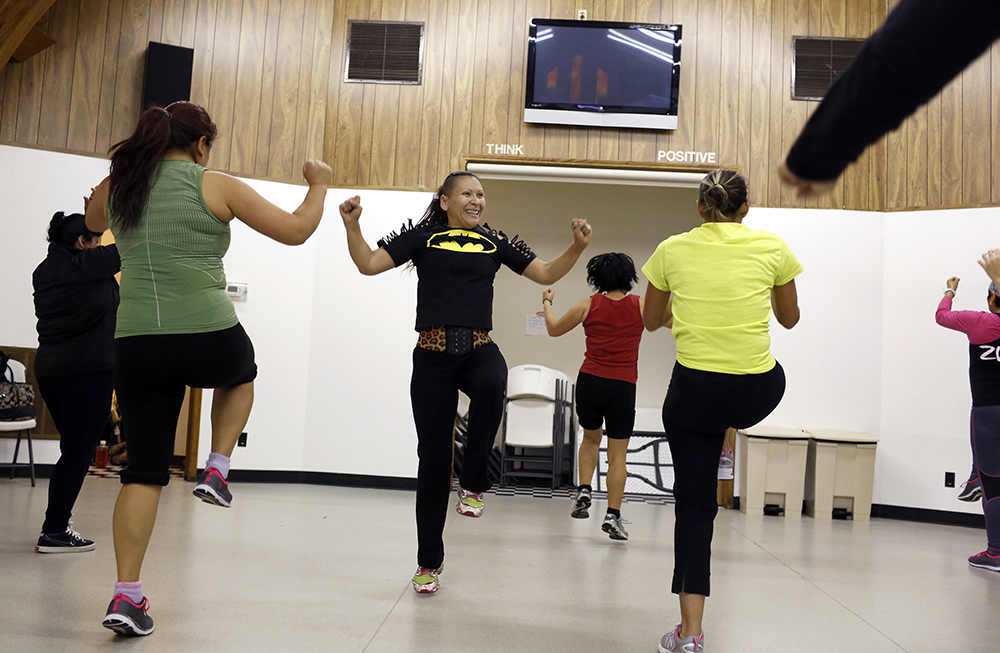
Maribel Del Campo, center, leads a Zumba class held in The Old Church at Jubilee Park across from Jubilee Park Community Center. Photo/Lara Solt
At the Jubilee Park Community Center, things can get pretty busy. There’s Zumba, and seniors are eating lunch.
But there are moments of quiet – so quiet that the loudest thing in the room is Gloria Lopez typing.
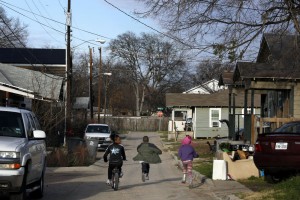
Kids run down a street in the Jubilee Park neighborhood. Photo/Lara Solt
She’s been volunteering here for years, and took on a part-time job in May. As a receptionist, Lopez takes home $1,000 a month. The man she lives with makes about the same remodeling houses.
“Right now, I think my checking account has probably about $100 after I got done paying all my bills,” she said.
Two thousand dollars a month doesn’t stretch far when it has to cover a family of three. Lopez has a 12-year-old son to care for, too.
“My main concern is him right now,” she said. “If I don’t have money set aside for him in an emergency, if I have to take him to the hospital or buy some medicine that Medicaid won’t cover. If I don’t have it, he doesn’t have the medicine.”
Lopez does her best to pay the rent, bills and keep a little for extra expenses. She doesn’t always make it.
“And when we can’t make it, we go to the loan place,” she says.
A $600 loan costs $2,000
That’s where she gets a cash loan – but she has to hand over her car title while she pays it off.
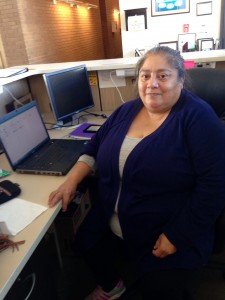
Gloria Lopez, a worker at Jubilee Park Community Center, takes out high-interest loans to cover her bills. Photo/Courtney Collins
If you don’t pay the loan off, there’s a fee added every month. If you don’t pay that, you lose your car.
That’s never happened to Lopez. She’s borrowed money this way three different times. She’s still working to pay off the last loan, which she took out last summer.
She has to pay a $230 fee to take out that loan. Each month, another $230 is due. Lopez says it usually takes her six to eight months to pay it all off.
That means she’s paid about $2,000 on a $600 loan.
“When all the credit available is credit that is exceedingly expensive at rates of 300 to 600 percent interest, it is draining the financial stability of our families,” says Ann Baddour with Texas Appleseed, a nonprofit working for loan reform.
“And what we’ve seen is an explosion in very high-cost products.”
Payday and car title lenders can get around state limits on interest by charging fees to roll loans over.
Baddour says two years ago, one of every 10 Texans took out this kind of loan. More than half of that group had to refinance — and most re-financers rolled the loan over four or five times.
“In our mind, predatory lending is a situation where you have lender success, and borrower failure,” she said.
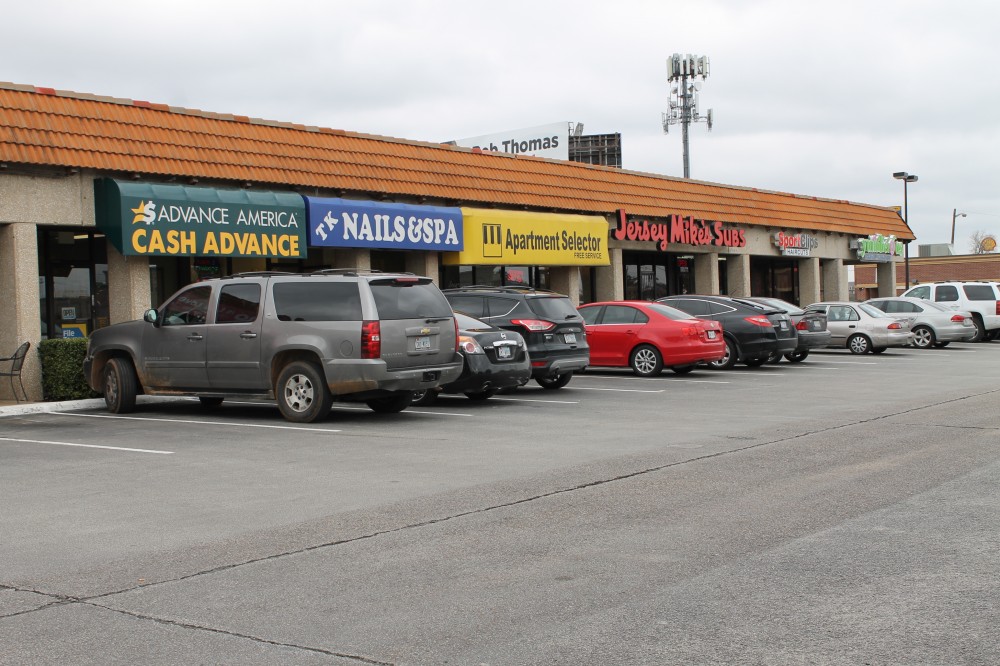
Many Texans use payday loan stores, such as this one on Greenville Avenue in Dallas, to pay bills. Photo/Courtney Collins
A solution: Employer-based lending
So what’s the solution? Baddour says the state could enforce a cap on interest rates and fees.
Another option? Finding fair alternatives for borrowers.
Paul Randle is trying to make that happen with the nonprofit Community Loan Center of Dallas.
“This program was tested and piloted in the Rio Grande Valley where they have made over 3,400 loans lending over $3 million,” Randle said.
That program is known as employer-based lending.
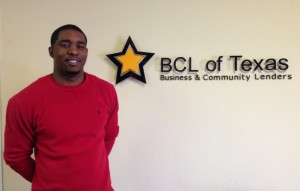
Paul Randle is with the nonprofit Community Loan Center of Dallas. Photo/Courtney Collins
Here’s how it works. The nonprofit puts up the loan money, and signs up employers. Once a company commits, its employees can take out loans for a $20 fee at a fixed interest rate of 18 percent.
That may sound high. But compared to the fees on a payday loan, it’s a bargain.
You can borrow up to $1,000 at a time – or 55 percent of what you earn monthly.
“You can’t borrow more than you make,” Randle said.
The repayment is automatically deducted from the workers’ paycheck, over the course of a year, so you can’t miss a payment.
And that bolsters your credit score.
Across North Texas, Lots Of Payday Lenders
There are hundreds of payday stores across North Texas — nearly 300 in Dallas County alone. They’re often covered in bright lights and large signs, with messages like “cash advance” and “pay bills.”
A payday lender will give you a small loan in exchange for a fee. The fee is due up front, while the loan amount is due on your next payday. If you can’t pay the complete loan by your next payday, you can roll it over another two weeks, but you must pay the fee again. Many people roll these loans over several times.
This map shows where payday lending stores are located in Dallas County as of January 2015.
Mark Gilman of the Dallas Public Library conducted research for this graphic.
Graphic/Ryan Tainter
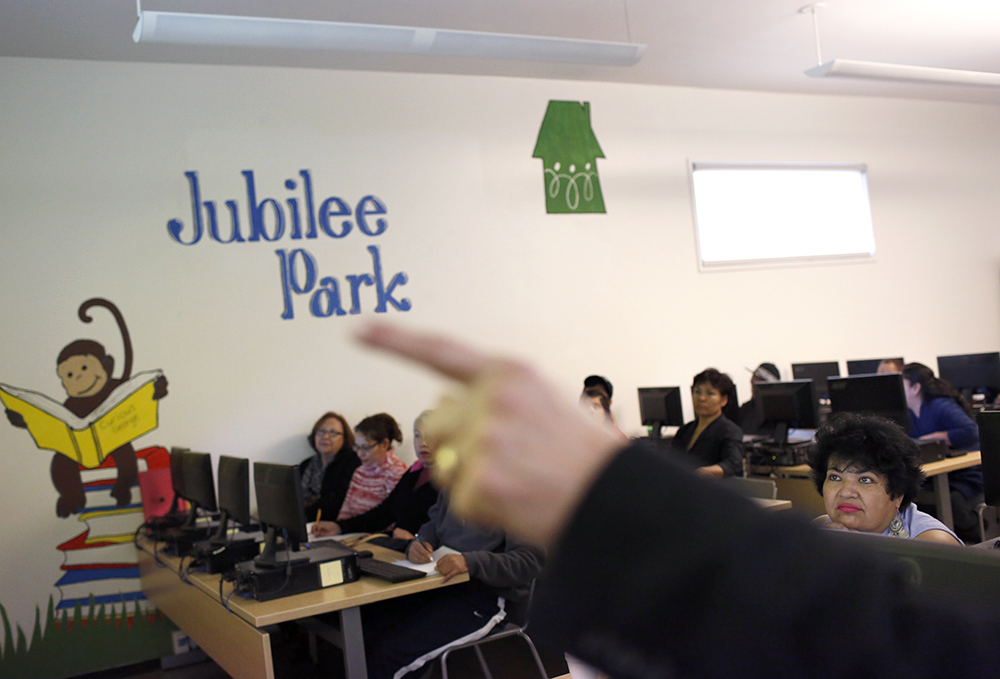
A computer class at the Jubilee Park Community Center in Jubilee Park. Photo/Lara Solt
Payday lender: We offer transparency
Randle says it feels good to help people get on their feet. After a year working in the corporate office of Texas-based payday lender ACE Cash Express, he says he needed a change.
“It was very sad; it got depressing,” he said. “That I was calling and preying on them, and hounding them and saw the excessive fees on the back end that was being charged to them.”
Eric Norrington with ACE Cash Express says every borrower knows exactly what a loan is going to cost. There aren’t any hidden fees or surprises.
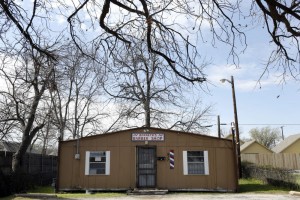
Kenneth’s Barber Shop is located in Jubilee Park in Dallas. Photo/Lara Solt
“We work hard to provide clear, transparent terms to consumers,” Norrington said. “We post our fees in the lobby of our stores. We offer a two-week signature loan at a rate that is often more favorable than overdrafting a checking account or bouncing a check.”
ACE does allow borrowers to opt into an interest-free payment plan once a year. That means you can pay off your loan balance by splitting it into four equal payments.
Rob Norcross thinks there will always be a market for small dollar loans. He’s with the Consumer Service Alliance of Texas, the trade association that represents companies like ACE.
“Payday stores and the auto title stores fill that place in the marketplace and provide credit for predominantly credit-challenged folks,” Norcross said.
Four years ago, the city of Dallas enacted an ordinance restricting payday lenders. It limits rollovers to three times and loans can’t exceed 20 percent of a borrower’s monthly income.
It’s not hard to get around that though. The company Gloria Lopez uses is outside the city limits.
“I don’t think people would do it because they want money, they want to go spend it,” Baddour said. “They normally do it because they need it.”
Critics of payday loans say that’s exactly what predatory lenders are banking on.
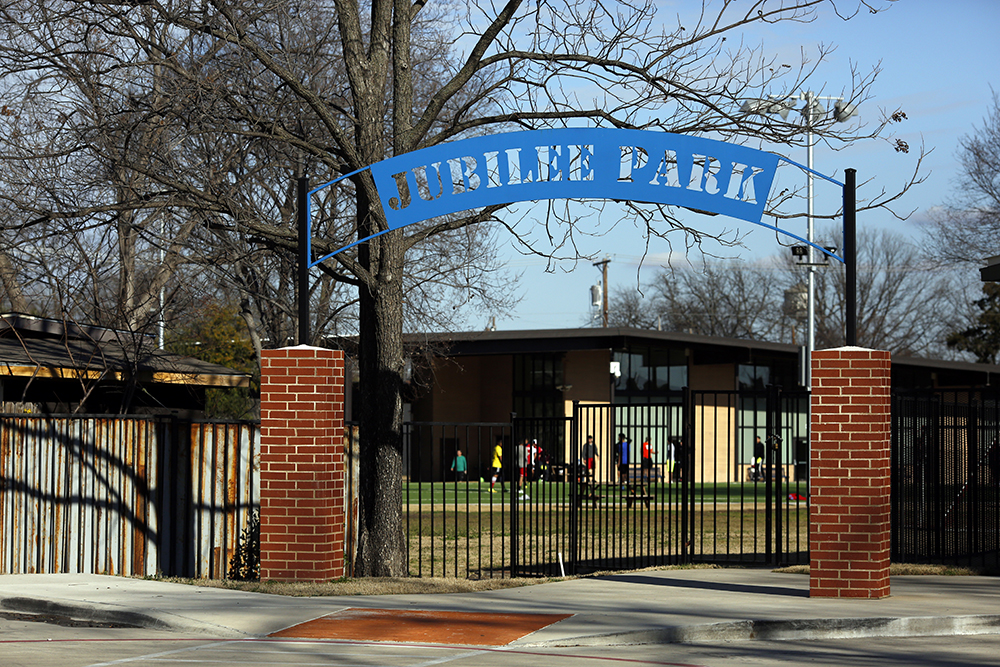
A soccer field donated by FC Dallas Foundation and the Embassy of the United Arab Emirates. Photo/Lara Solt
Video Snapshot: Explore The Community Center
The Jubilee Park Community Center offers several programs that help a variety of people, from children to seniors to those who want to learn English. In this video, explore the center.
About payday loans
- “The cost of the loan (finance charge) may range from $10 to $30 for every $100 borrowed,” the Consumer Financial Protection Bureau says. “A typical two-week payday loan with a $15 per $100 fee equates to an annual percentage rate (APR) of almost 400 percent. By comparison, APRs on credit cards can range from about 12 percent to 30 percent.”
- About 12 million Americans use payday loans each year, according to a 2012 study by the Pew Charitable Trusts. “On average, a borrower takes out eight loans of $375 each per year and spends $520 on interest,” the report says. “Most borrowers use payday loans to cover ordinary living expenses over the course of months, not unexpected emergencies over the course of weeks. The average borrower is indebted about five months of the year.”
-
The payday lending industry says it provides a service that many people need. The Texas Tribune reported in 2014: “Rob Norcross, a spokesman for the Consumer Service Alliance of Texas, a payday lending industry group, said that people misunderstand how annual percentage rates are applied to small, short-term loans. An interest rate of 400 percent sounds high, but could translate into borrowing $100 and paying back $117, he said. ‘A lot of the criticism of the industry is because of the numbers,’ Norcross said. ‘Folks really don’t understand how you arrive at the numbers.'”
-
Some Texas cities, including Dallas, have passed ordinances regulating payday lenders. The Texas Tribune reported: “Dallas, El Paso, Austin and, most recently, Houston have passed ordinances restricting payday and auto-title loans, but an effort to impose state regulations on such lenders failed [in 2013]. … [The Consumer Service Alliance of Texas] favors a statewide regulatory framework over city ordinances. The group has filed lawsuits over several of the ordinances, which [Norcross] said threatened businesses and limited borrowers’ access to credit.”
Sources: Consumer Financial Protection Bureau; Pew Charitable Trusts; Texas Tribune; KERA Research


